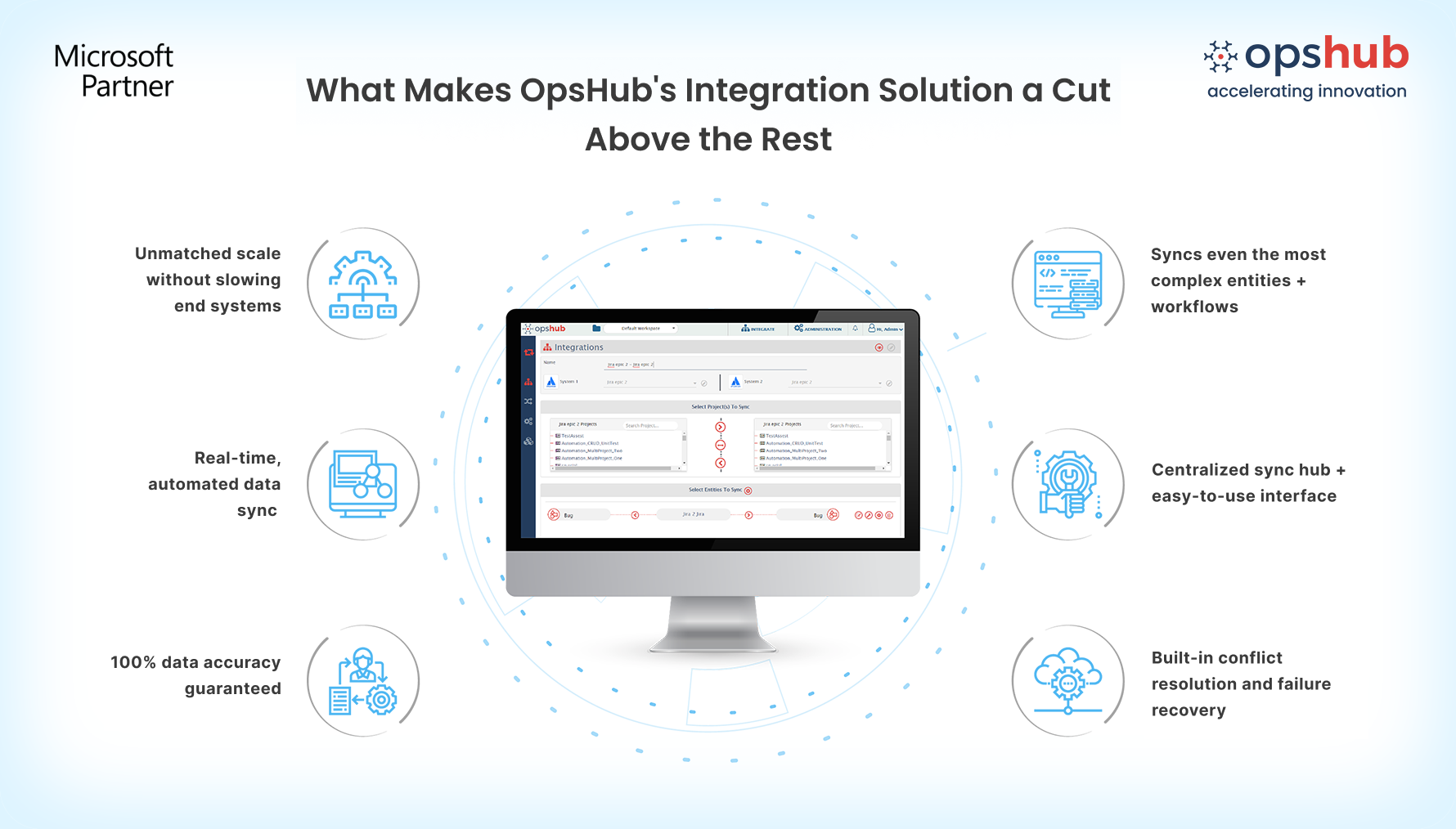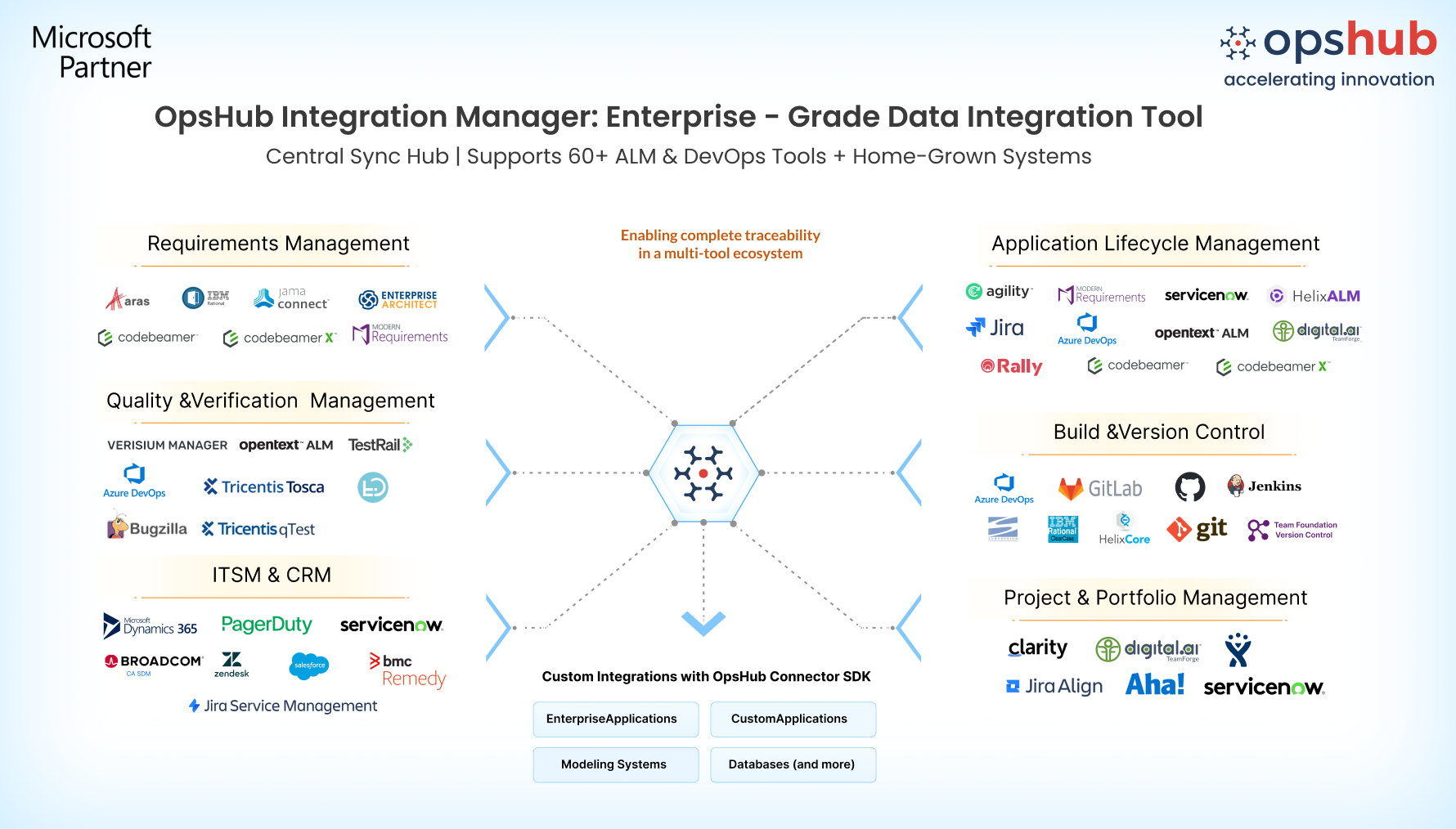Overview
Development and QA teams often struggle with disconnected toolchains, manual data sync, and limited visibility, leading to delays and errors. Integrating OpenText ALM and Azure DevOps using enterprise-grade solution, OpsHub Integration Manager (OIM), helps in bringing the product development and QA teams on the same page. As both teams have visibility into each other's tasks and the complete context of customer expectations, the quality of the product is better, and the delivery cycle is shorter.
Learn more about how OIM facilitates OpenText ALM and Azure DevOps integration using OIM.
Why OIM is the Best Choice for Integrating Azure DevOps and OpenText ALM
Elevate software quality and compliance with OIM-driven Azure DevOps (both Server & Services) and OpenText ALM (formerly Micro Focus ALM, HP ALM) integration:
Scale across 1000+ projects without impacting end-system performance: OIM is built to handle growing business needs, regardless of the size of teams or projects. End systems operate seamlessly, and workflows remain uninterrupted.
Integrate applications with complete data accuracy: Ensure 100% accurate and reliable data synced with full visibility into entity movement, deletion, history, and attachments, providing context for every piece of information.
Sync popular tools effortlessly: With support for over 60 ALM, DevOps, and ITSM tools, as well as home-grown or custom connectors.
Sophisticated low-code/no-code interface: Sync application data without coding expertise or manual effort. OIM’s centralized interface ensures smooth, hassle-free synchronization.
Move beyond basic entities: Sync test results, defects, test cases, mentions, and more, including custom work items with complete history.
Keep project structures intact: When an entity is moved from Project A to Project B, OIM ensures it is not left behind as an orphan and that the transition remains smooth.
Ensure entity movement visibility: Changes like renaming a "Defect" to a "Bug" are reflected in the target system, keeping data aligned.
Flexible deployment options: Deploy your way as OIM offers on-premises and cloud deployment modes.
Robust error handling and data safety: With built-in conflict resolution, real-time error detection, advanced failure recovery, and detailed logs, OIM ensures data integrity even during failures.
Drop us a line for Free Demo to watch how OIM facilitates OpenText ALM and Azure DevOps bidirectional integration.

Popular Use Cases
End-to-end traceability: Sync requirements, test cases, and defects automatically for full lifecycle traceability across both systems.
Automated test management: Streamline test creation, execution, and defect tracking between Azure DevOps and OpenText ALM.
Real-time synchronization: Keep development and QA teams updated with real-time data across both platforms.
Defect lifecycle management: Track and resolve defects seamlessly across both systems.
Compliance and reporting: Ensure full test coverage and maintain proper documentation for compliance.
Risk and impact analysis: Use integrated data for better risk evaluation and informed decision-making.
Cross-team collaboration: Improve alignment and reduce delays by providing teams with shared, up-to-date data.
Faster release cycles: Accelerate delivery with automated bidirectional synchronization and improved collaboration.
Integrate Azure DevOps and OpenText ALM in 5 Easy Steps
OpsHub Integration Manager (OIM) offers an easy-to-use GUI and an intuitive user experience, enabling users to configure the Azure DevOps (VSTS/TFS) and OpenText ALM unidirectional or bidirectional integration with ease.
Configure ADO and OpenText ALM systems.
Select project(s) to be integrated.
Select entity(s) to be integrated.
Select sync direction and sync filter.
Click and map fields to be integrated.
Make your OpenText ALM and ADO systems work as one. No rework. No delays. Just clean, reliable integration. Try OpsHub for Free.

Bottom Line
When integrating Azure DevOps (ADO) and OpenText ALM, selecting the right solution is crucial to navigate the complexities of business operations such as handling large volumes of data, ensuring data consistency across systems, and managing different workflows. While plugins may seem like a quick fix, they often fall short in terms of scalability, reliability, and the comprehensive features required for enterprise-level integrations.
Connect with our Integration Engineer to discuss your use case.



